June 21, 2025 | 12:38 GMT +7
June 21, 2025 | 12:38 GMT +7
Hotline: 0913.378.918
June 21, 2025 | 12:38 GMT +7
Hotline: 0913.378.918
At the Vinacam Hon Dat Agricultural Cooperative (Son An village, Nam Thai Son commune, Hon Dat district of Kien Giang province), hundreds of farmers convened to participate in a seminar to evaluate the rice production model that employs the on-field straw handling technique for the summer-fall crop of 2024. After meticulously examining a rice cluster laden with rice flowers, several farmers were astounded to discover that the paddle had thrived due to the nutrients from the organic fertilizer managed from the straw of the previous crop.
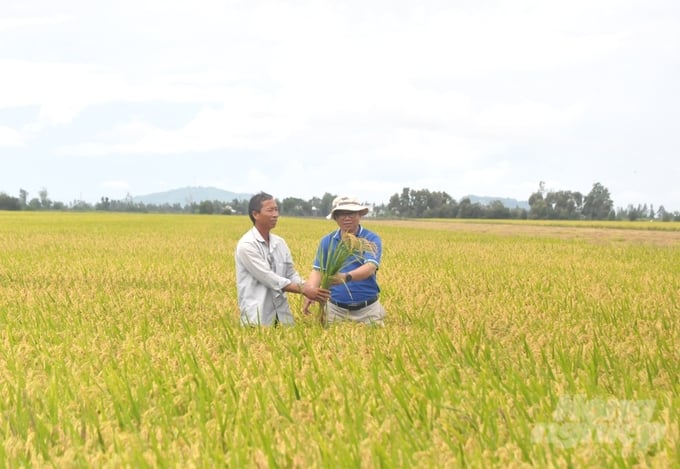
Applying Sumitri microbiological products to process straw right in the field into organic fertilizer to add nutrients to the soil, helping rice grow well and increasing economic efficiency. Photo: Trung Chanh.
Mr. Nguyen Tan Duc, Director of Vinacam Hon Dat Agricultural Cooperative, is a pioneer in the local implementation of techniques that directly convert straw into organic fertilizer in the fields to enrich the soil. The Southern Office of the National Agricultural Extension Center, in partnership with the Kien Giang Agricultural Extension Center and Phương Nam Rural Development Co., Ltd., supports this model.
Sumitri converts refuse into organic fertilizer in the field, thereby replenishing the organic matter in the soil and reducing the total fertilizer used per season by 20-30%. Rice yields are increased by 10-15%, and farmers' profits are boosted as the rice plants develop in a balanced manner, resulting in stronger and healthier plants.
The Vinacam Hon Dat Agricultural Cooperative contains 70 members and a total cultivation area of 520 hectares, with 430 hectares belonging to members and 90 hectares linked with other producers. In conjunction with the cooperative, Mr. Duc's family cultivates 12 hectares of land. Mr. Duc brazenly applied the technique to convert straw into organic fertilizer over 6 hectares during the summer-autumn rice season of 2024, thereby reducing production costs through his participation in the model.
To convert straw into organic fertilizer in the field, 3 hectares were treated with the Sumitri microbial product at a dosage of 3kg/ha and 3 hectares were treated with Crowel M+ organic fertilizer in combination with the Sumitri microbial product at a dosage of 200kg/ha. The straw completely decomposed after 15 days, thereby removing the potential for toxicity to rice plants and generating a source of organic fertilizer to enrich the soil.
Mr. Pham Xuan Hung, Director of Phuong Nam Rural Development Co., Ltd., stated that the use of Sumitri microbial products to directly convert straw into fertilizer in the field assists farmers in quitting the practice of burning fields, which contributes to environmental contamination. The need for a lengthy holding period between crops is eliminated by Sumitri's rapid decomposition of straw in the field. Farmers can mitigate the risk of organic poisoning by preparing the soil, applying Sumitri, and promptly planting or sowing.
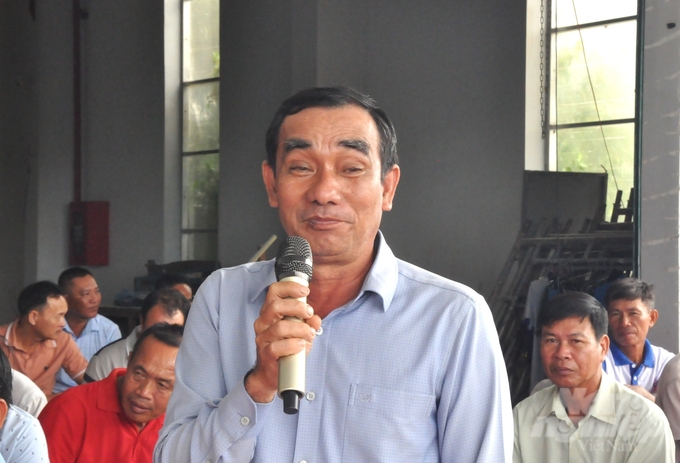
Mr. Nguyen Tan Duc, Director of Vinacam Hon Dat Agricultural Cooperative, shared the benefits of using Sumitri microbial products to process straw right in the field into organic fertilizer. Photo: Trung Chanh.
Sumitri's capacity to decompose weed seeds, wild rice seeds, and mixed rice seeds when utilized correctly also enables farmers to reduce the cost of herbicides, pesticides, and molluscicides. After being sown, rice plants develop robust stems, grow uniformly, and are more resilient to pests and diseases as a result of the organic nutrients that have decomposed from the straw. The emergence of newly hatching snails is restricted by the competition between microorganisms and snails for nutrients. Sumitri also contains strains that combat rice diseases, thereby substantially reducing the damage caused by bacterial leaf blight, rice blast, and sheath blight.
The district of Hon Dat is home to 78,900 hectares of rice production land, which is predominantly utilized for the cultivation of two rice crops annually, according to the Agricultural Extension Station. In recent years, Hon Dat farmers have engaged in the extensive cultivation of the short-grain rice variety DS1 (Japanese rice), which occupies approximately 50% of the cultivated area each season.
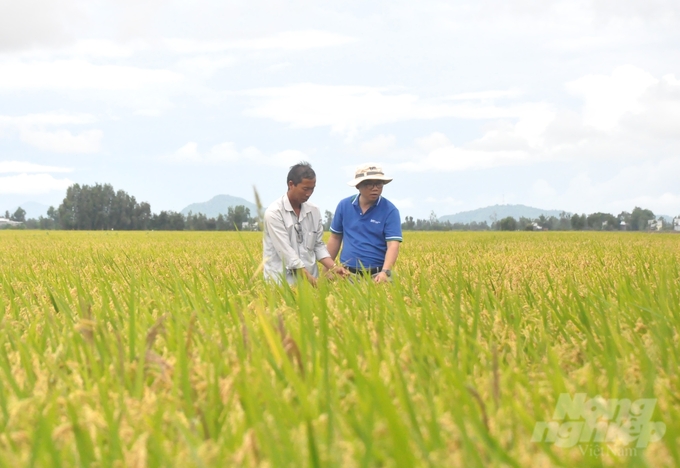
Using Sumitri microbial products helps decompose straw in the fields quickly, rice plants grow well, roots grow deep and strongly, and have few harmful pests and diseases. Photo: Trung Chanh.
Nevertheless, the DS1 variety yields a comparatively substantial quantity of straw that is more fibrous and durable than other short-duration rice varieties, resulting in a slower initial decomposition. This is because the straw is left behind after harvesting. Traders also refrain from purchasing DS1 rice straw for mushroom cultivation due to its rigid, fibrous texture, which renders it challenging to process.
Consequently, producers frequently elect to burn the straw in the fields as the most straightforward solution. Nevertheless, this practice results in the waste of organic nutrients, an increase in emissions, and air pollution from smoke.
The issue has been effectively resolved through the administration of the Sumitri microbial product. In a mere 15 days (as opposed to the agricultural sector's recommendation of a minimum of 20 days between crops), the Sumitri treatment completely blackens and softens the straw in the fields, transforming it into an organic nutrient source that has no risk of toxicity to rice plants. This is particularly important for farmers who cultivate three rice crops annually, as the brief planting intervals would otherwise result in the fields being burned if the microbial treatment was not implemented.
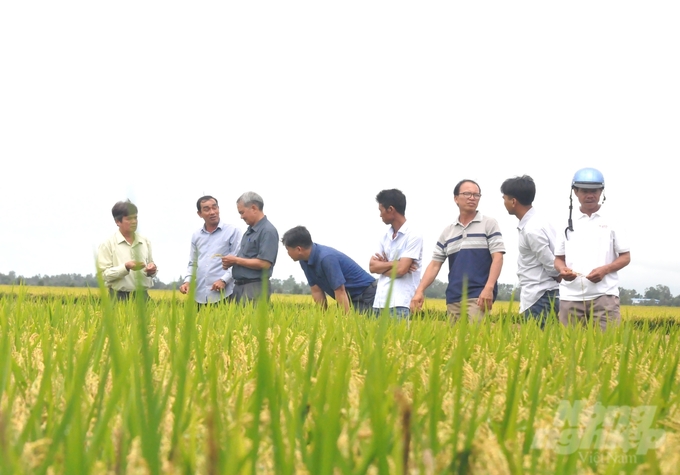
Farmers visited the demonstration field using Sumitri microbial product to decompose straw in the field and highly appreciated the model's effectiveness in terms of both environmental and economic benefits. Photo: Trung Chanh.
The Sumitri microbial product was observed to accelerate the decomposition of straw in the fields, promote healthy growth of rice plants with strong roots, and reduce pest infestations, particularly by preventing yellowing of the rice due to organic toxicity, during a visit to the demonstration model in Mr. Duc's fields. The use of microbial products to treat straw in the fields progressively contributes to soil improvement, reduces environmental pollution, lowers emissions, reduces production costs, increases rice yield and quality, and boosts a farmer's profits.
The experimental fields at Vinacam Hon Dat Agricultural Cooperative reduced the amount of seed sowed, decreased the use of chemical fertilizers, cut down on pesticide costs, lowered production costs, and increased profits by adhering to technical requirements.
Fields treated with the Sumitri microbial product yielded 8 tons per hectare for the same DS1 rice variety, resulting in a total revenue of 62.4 million VND per hectare and a profit of approximately 41 million VND per hectare. The total revenue per hectare was 65.5 million VND, and the profit per hectare was 43.2 million VND. The fields that utilized Crowel M+ organic fertilizer in conjunction with Sumitri microbial product produced 8.4 kilograms per hectare. The control fields generated a total revenue of 60.8 million VND per hectare and a profit of 36.8 million VND per hectare, with a yield of 7.8 tons per hectare.
Translated by Linh Linh
![Turning wind and rain into action: [11] Ten years before storms, after every harvest](https://t.ex-cdn.com/nongnghiepmoitruong.vn/608w/files/news/2025/06/20/z6704423696987_15fd32ffc26d590d204d520c9dac6786-nongnghiep-140922.jpg)
(VAN) With WeatherPlus, every raindrop and every breeze carries a message. And if we learn to listen, the fields will no longer live in fear of the weather.
![Turning wind and rain into action: [10] Advancing accessible climate services for farmers](https://t.ex-cdn.com/nongnghiepmoitruong.vn/608w/files/linhnhp/2025/06/20/1911-z6704423696987_15fd32ffc26d590d204d520c9dac6786-nongnghiep-161854.jpg)
(VAN) Not only does it help farmers 'avoid droughts and rains,' the development of agricultural climate services also enhances their ability to proactively adapt to a rapidly changing climate.
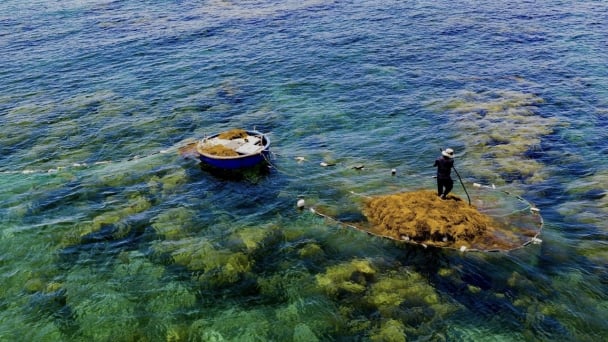
(VAN) With international assistance, the harvesting of sargassum seaweed in Quang Ngai has become increasingly regulated, thereby safeguarding marine life and ensuring the stability of coastal communities' livelihoods.
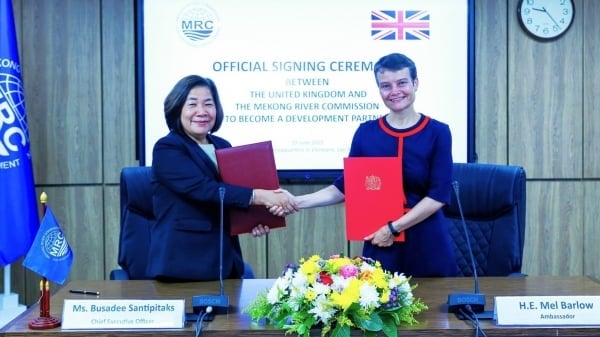
(VAN) On June 19, the United Kingdom officially became a Development Partner of the Mekong River Commission.

(VAN) Biodiversity is being threatened by traditional remedies made from wildlife. Traditional medicine and humans must change to live in harmony with nature.

(VAN) Agrifood investment and finance solutions for people and the planet.

(VAN) Microplastic contamination has become pervasive in seafood, posing unprecedented challenges for food safety and marine ecosystems.